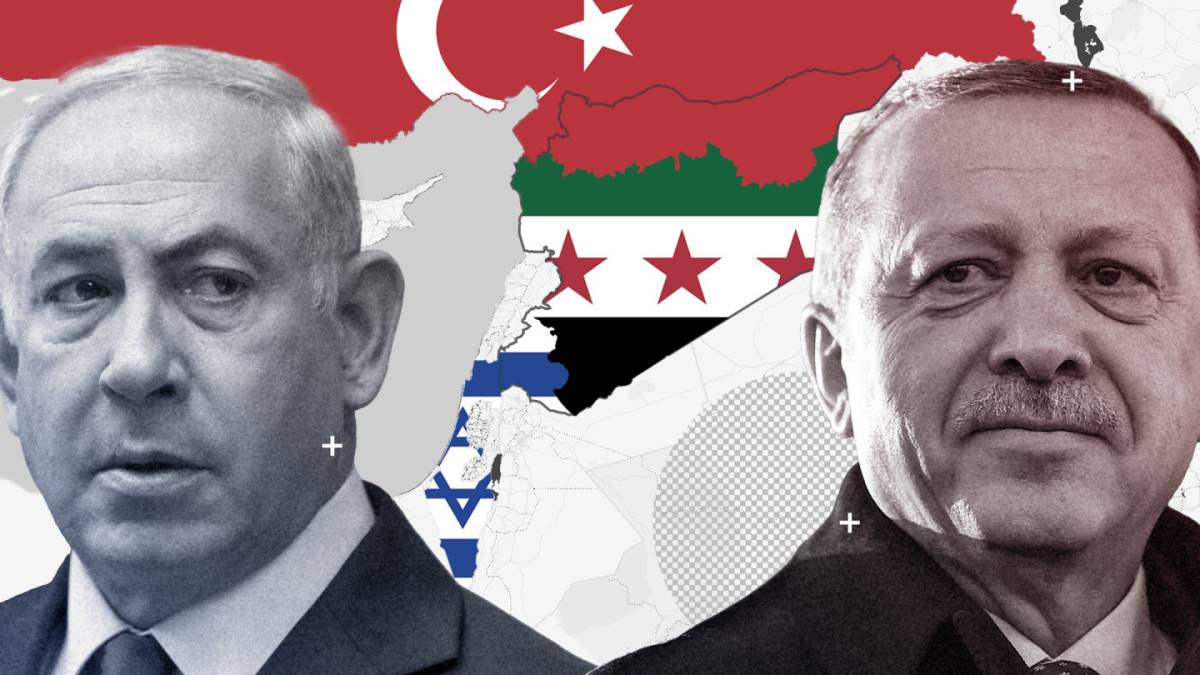670 Views
Mediterranean Tinderbox: How Israel and Turkey’s Shadow War Edges toward Open Conflict
The once-shadowed confrontation between Tel Aviv and Ankara in Syria has evolved from a “proxy war” into a potential direct showdown. Turkey, which controls northern Syria, is now reportedly deploying S-400 systems and drones at key bases such as T-4 and Hama. On the other side, Israel has shown no hesitation in striking Turkish-linked positions inside Syrian territory.
In recent years, relations between Israel and Turkey have plunged to their lowest point in decades. The rift, rooted in deep geopolitical disagreements, Ankara’s support for Hamas, and its sharp criticism of Israel’s operations in Gaza, has now spilled into new arenas—Syria, Cyprus, and Greece. The fall of Bashar al-Assad’s government in December 2024 turned Syria into the main stage for proxy competition, while the race for Eastern Mediterranean gas and maritime borders has bound Cyprus and Greece even closer to Israel.
Historical Background
Israeli-Turkish relations peaked in the 1990s. Turkey was the first Muslim-majority country to recognize Israel, and both enjoyed extensive military and intelligence cooperation. But since 2010—after the Mavi Marmara incident and Erdoğan’s vocal defense of Palestinians—the relationship has steadily deteriorated.
The Gaza War of 2023–2024 deepened the divide. Turkey suspended trade with Israel, and Erdoğan publicly branded Netanyahu as “the greatest threat to the Middle East.”
The collapse of Assad’s government marked a turning point. Turkey, which had long supported the Syrian armed opposition (largely composed of hardline militants), now wields significant influence in northern Syria and has even signed a defense pact with the new Damascus leadership under Julani.
Israel, however, sees this as a threat. Tel Aviv envisions a “federal Syria” divided into autonomous zones—fragmented enough to neutralize any centralized power. Since Assad’s fall, Israel has carried out hundreds of airstrikes on Syrian bases and infrastructure to cripple emerging centers of authority.
The Syrian Front
The confrontation between Tel Aviv and Ankara in Syria appears to be shifting from proxy tension to potential direct engagement. Turkey’s plan to install S-400 air defense systems and combat drones at key military sites has alarmed Israel, which has already bombed some of these locations and warned that “any foreign force posing a threat will be targeted.”
Ankara accuses Israel of “occupation” in the Golan Heights and southern Syria and claims that Israel’s attacks are aimed at weakening the new Damascus government, which is essentially aligned with Turkey. Analysts note that Erdoğan’s rhetorical fury rarely translates into real confrontation, given the long-standing—if discreet—security relationship between Ankara and Tel Aviv.
Still, Turkish Foreign Minister Hakan Fidan confirmed in April 2025 that “technical talks” to prevent escalation had begun, though he blamed Israel for “deliberately creating instability.”
The Israeli Viewpoint
From Tel Aviv’s perspective, Turkey’s growing military footprint in Syria and its support for Hamas constitute a serious threat. Netanyahu views Syria as “Iran’s former backyard”—one now being overtaken by Ankara. Turkish admiral-turned-analyst Cem Gürdeniz has even warned that the first clashes between the two powers are likely to erupt “in Syrian skies or on its soil.”
Despite such warnings, secret negotiations to establish a “deconfliction mechanism” began in April 2025, with both sides insisting they seek to avoid war.
The Eastern Mediterranean Front: Gas, Borders, and Alliances
Competition over Eastern Mediterranean gas—estimated at 122 trillion cubic feet—has intensified since 2010. The discovery of Israel’s Leviathan , Cyprus’s Aphrodite , and Egypt’s Zohr gas fields led to the formation of the Eastern Mediterranean Gas Forum (EMGF) in 2019, comprising Israel, Cyprus, Greece, Egypt, and Italy—without Turkey.
The $6 billion EastMed pipeline project, stretching 1,900 kilometers from Israel to Europe via Cyprus and Greece, bypasses Turkey entirely. Ankara accuses the alliance of violating its claimed Exclusive Economic Zones (EEZs).
Cyprus: The New Frontline
Israel increasingly sees Cyprus as a “new Haifa.” Thousands of Israelis have purchased property there, while Israel has deployed Barak MX and Iron Dome air-defense systems in southern Cyprus. Meanwhile, Turkey occupies northern Cyprus, where it has stationed armed drones and ATMACA missiles capable of reaching Israel’s offshore gas fields.
Greece: The Expanding Alliance
Joint military drills between Greece, Cyprus, and Israel—like the 2021 exercise—and Athens’ purchase of Israeli defense systems such as Spyder have fed Ankara’s perception of encirclement. Greece has launched its “Achilles Shield” initiative, integrating the Iron Dome into its national defense network.
In response, Turkey signed a maritime deal with Libya to obstruct the EastMed pipeline, a move condemned by Athens and Nicosia as illegal. Meanwhile, Israel, Greece, and Cyprus continue joint naval exercises to counter Turkey’s maritime ambitions.
Amid these displays of military power, Turkey unveiled its Typhoon Block-4 missile—with a range capable of striking Israel—and the “Ghazab” or “Wrath” bomb. It has also accelerated its nuclear energy program.
In essence, the Israel–Turkey confrontation—centered on Syria, Greece, and Cyprus—is a volatile blend of energy rivalry, border security, and ideological tension. The fall of Assad gave Turkey a unique opening for regional dominance, but Israel has responded through preemptive strikes and the formation of a Greece-Cyprus alliance.
Resolving this crisis will require multilayered diplomacy: addressing the Cyprus issue, negotiating a joint gas pipeline framework, and establishing deconfliction mechanisms in Syria. Without these, the Eastern Mediterranean risks morphing into a new “South China Sea”—a crowded chessboard of warships, overlapping claims, and endless brinkmanship.
Arab media such as Al Jazeera emphasize Israel’s “occupation,” while Western outlets like Reuters and BBC focus on “Turkey’s ambitions.” The future—whether confrontation or détente—depends largely on Netanyahu and Erdoğan. Economic interests, especially gas, might ultimately prove the only bridge strong enough to hold both sides back from the edge.
https://www.aljazeera.com/news/2025/4/10/turkiye-and-israel-hold-talks-to-avoid-clashes-in-syria
https://carnegieendowment.org/emissary/2025/07/turkey-israel-syria-escalating-rivalry?lang=en
https://www.mashreghnews.ir/news/1749512/
https://www.yjc.ir/fa/news/8936818
https://parsi.euronews.com/2024/12/10/israel-destroys-syrian-navy-netanyahu-to-new-leaders-do-not-allow-iran-to-be-present-in-sy
https://www.mashreghnews.ir/news/1755629/
https://www.isna.ir/news/1404012110542
https://kurdpress.com/news/2785017
https://www.yjc.ir/fa/news/9004335
https://www.eghtesadnews.com/fa/tiny/news-694745
https://parsi.euronews.com/2020/01/02/greece-cyprus-and-israel-signed-agreement-eastmed-the-undersea-pipeline-gas-mediterranean
https://www.magiran.com/article/4643486
https://www.mehrnews.com/news/6609547
https://www.trtfarsi.com/article/6219701ca83c

Comment
Post a comment for this article